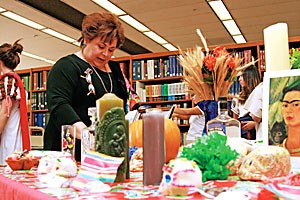This week the UA community will celebrate Dia de los Muertos, a popular holiday in Mexican and Latin American cultures, which observes the cycle of life in conjunction with remembrance of the dead.
The Nov. 1 Day of the Dead, which has been underplayed in the United States, is largely community-oriented, as families gather to bring flowers and favorite food items of the deceased to their respective gravesites, said Anna Ochoa O’Leary, an adjunct lecturer in Mexican-American studies.
The festivities continue with All Souls’ Day on Nov. 2, when weeds in cemeteries are often pulled and gravesites cleaned, O’Leary said.
“”It is a joyous time,”” O’Leary said. “”It is different from the American sense that death brings misery and an ending, in that here, death brings on rebirth and the continuation of the cycle of life.””
Students from Alba Nora Martinez’ Spanish 323 class sang and recited traditional Mexican songs yesterday at the UA Main Library while demonstrating the setting of the altar.
Adding even more to the festivities, a mariachi band played as students placed candles, bread, candy and photographs on the altar.
Martinez, an adjunct lecturer in Spanish and Portuguese, said she wanted her students to participate in this event in an effort to educate and reach out to the community.
“”Living here in Tucson, we hear about Day of the Dead, but we don’t necessarily know about the culture or the rituals involving the setting of the altar,”” said Alex Yanine, an accounting junior in Martinez’ class who participated in the ceremony.
Orel Zaninovich, a molecular and cellular biology senior, said the class aimed to explain the purpose of the traditions and rituals practiced throughout Latin America.
The UA libraries will display the altar, traditional Dia de los Muertos figurines and related library books on the first floor of the library until Nov. 10, said Federico Martinez-Garcia Jr., a library information associate.
“”The library has a responsibility to provide information, and that includes making people aware of other cultures,”” Martinez-Garcia said.
In a similar celebration, Chicano/Hispano Student Affairs will be hosting a student faculty luncheon Nov. 2 in observance and celebration, said Oscar Angulo, an administrative assistant for Chicano/Hispano Student Affairs.
The luncheon, for which a turnout of 100 to 150 is expected, will take place on the second floor of the CǸsar E. Chávez building and will feature decorations made by students enrolled in higher education 197, Success Express, Angulo said.
“”This holiday is a big deal in Mexico,”” Angulo explained. “”It’s similar to the significance of Memorial Day here.””
In the past, the Catholic Church in the United States has discouraged or banned the religious observance of Day of the Dead because it was seen as superstitious and indigenous, O’Leary said.
But there has been a resurgence of interest in the holiday in past years that has led back to original practices, O’Leary said.
“”People from the past are important in knowing who you are today,”” O’Leary said. “”They add to a sense of identity, and if we do not have that, we’re adrift in the world with no sense of belonging.””









